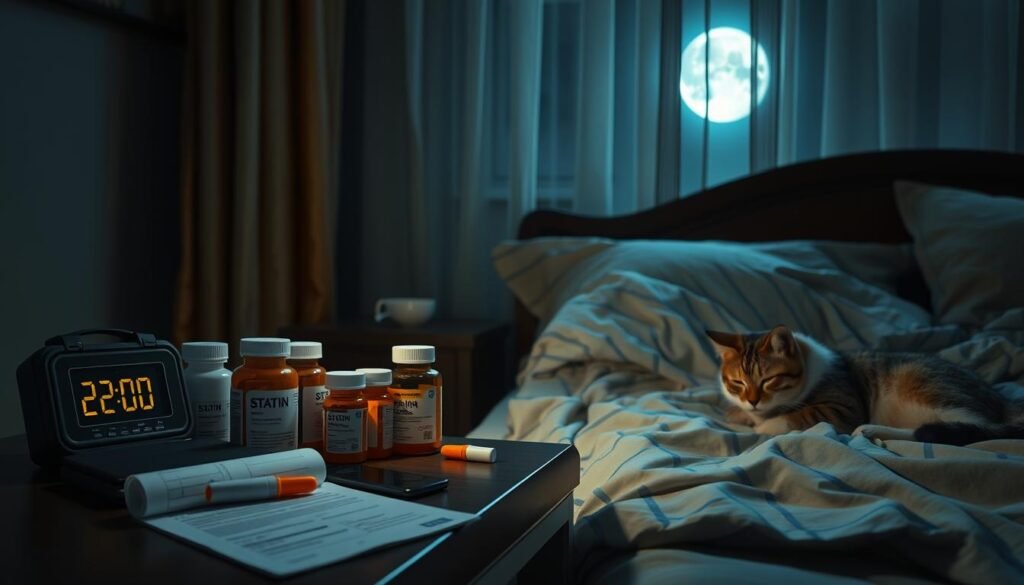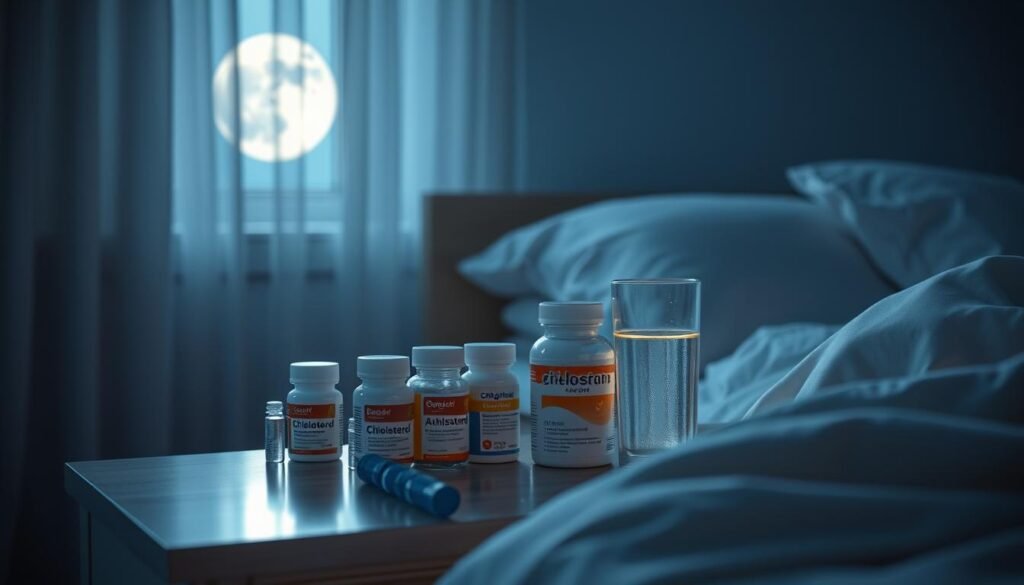Research involving over 100,000 patients shows that statins don’t often cause insomnia compared to a placebo. This fact prompts us to think more about how cholesterol management affects sleep. Since some people have sleep issues with certain statins, switching statins could help.
Many believe statin side effects might hurt sleep, but the ‘nocebo’ effect is also at play. Choosing the right statin can improve sleep and wellness. This article highlights that statins like pravastatin disrupt sleep less than simvastatin. Knowing these differences can help people on cholesterol meds sleep better.
Key Takeaways
- Statins, in general, do not cause sleep disturbances compared to placebos.
- The nocebo effect may contribute to reported sleep issues in some patients.
- Switching to different statins may enhance sleep quality for those with side effects.
- Pravastatin may offer better sleep outcomes than simvastatin.
- Understanding pharmacokinetics can help in selecting the right statin for improved health.
Understanding Statins and Their Role in Health
Statins are key lipid-lowering drugs used to lower cholesterol levels. They work by blocking a liver enzyme that makes cholesterol. This helps lower the risk of heart attacks and strokes.
Cardiovascular disease (CVD) causes one-third of all deaths worldwide, totaling about 17.3 million each year. Statins play a crucial role in fighting these deaths, especially for those with heart problems. Studies show reducing LDL cholesterol by each mmol/L cuts down major heart issues by 22% annually.
Atorvastatin can lower LDL cholesterol by more than 50% with a 40 mg dose. In comparison, pravastatin and simvastatin reduce it by 25–35% with a 20 mg dose. The effectiveness of these lipid-lowering drugs doesn’t depend much on the patient, so higher doses can lower LDL more.
Statins also reduce the chance of blood clots in veins and lungs by 30–40%. In the UK, doctors prescribe various statins to protect heart health.
Statins are vital for those at risk of heart issues, impacting overall wellness. For more on statins’ effects, including cholesterol management, check these studies. They discuss side effects and call for further research on sleep and physical function.
The Connection Between Statins and Sleep Quality
Recently, studies have looked at how statins might affect sleep. A key study involved 1,016 healthy adults. It compared the effects of simvastatin and pravastatin on them over six months. Those on simvastatin had worse sleep quality than those on pravastatin or a placebo.
They reported more sleep problems. This highlights the need to look at other statins for people with insomnia. It shows we should consider different statins if sleep issues arise.
The research connected sleep quality with overall health. It showed why managing medications effectively is important. People on simvastatin also had mood changes, like feeling more aggressive. So, talking to doctors about any sleep issues is crucial.
If you’re having trouble sleeping, looking at other statins might help. This is an important step to take.
How cholesterol drugs impact sleep can help find better treatments. Knowing that each person and their health can affect sleep helps. It’s important for patients to tell their doctors about their statin experiences. This way, they can work together to improve sleep.
Common Statin Side Effects Linked to Sleep
Statins are often used to lower cholesterol. They sometimes cause muscle pain, tiredness, and sleep problems. Around 37.5-48.6% of people take statins. Most handle them well, but a few have side effects that disturb their sleep. These statin side effects can make nights tough for some.
Muscle Pain and Fatigue
About 3-5% of those on statins feel muscle pain and tiredness. Very few, about 0.1-0.2%, have myopathy. This discomfort can mess with sleep and well-being. Less than 5% can’t tolerate the pain. It keeps them from sleeping well, adding to their sleep troubles.
Insomnia and Nighttime Disturbances
Research shows statins make it hard for people to sleep. They take longer to fall asleep and wake up often at night. Those on atorvastatin or rosuvastatin have worse sleep, studies say. Some studies link statins to insomnia and bad dreams. It’s key to talk to doctors if statins make sleeping hard. They can help find ways to improve sleep quality.
Evidence Around Statins and Sleep Disturbances
Studies have given mixed results on how statins affect sleep quality. This sparks curiosity about their connection to sleep issues. A lot of research looks at how statin use alters sleep perceptions, especially due to nocebo effects.
Research Findings on Statins’ Impact on Sleep
Research shows statins barely touch total sleep time. A detailed review found statins cut sleep by just -7.75 minutes, a drop not important enough to count. The quality of sleep, or sleep efficiency, was unchanged.
What’s interesting is that even though statins didn’t alter initial sleep stages, they helped reduce awake time. Wake time dropped by about -4.43 minutes. Also, statin users woke up fewer times, with awakenings down by -0.40 times.
Nocebo Effects in Statin Users
Nocebo effects play a big role too. Knowing about side effects can make some people more aware of sleep problems. This makes it harder to tell how statins really affect sleep. Teaching patients what to realistically expect with statins is key, especially when talking about options.

| Measurement | Statin Therapy | Significance |
|---|---|---|
| Total Sleep Duration | -7.75 min | p = 0.176 |
| Sleep Efficiency | 0.09% | p = 0.940 |
| Wake Time Reduction | -4.43 min | p = 0.014 |
| Awakenings | -0.40 | p |
Switching to Other Statins for Better Sleep
If sleep problems come from using statins, considering other types might help you sleep better. The statin you pick greatly influences possible side effects, like sleep disturbances. Knowing the difference between hydrophilic and lipophilic statins is key to choosing right.
Choosing Hydrophilic vs. Lipophilic Statins
Generally, hydrophilic statins, for example, pravastatin, lead to fewer sleep issues than lipophilic ones like simvastatin. Research shows that people using simvastatin often experience more sleep problems and poorer sleep quality. So, opting for hydrophilic statins may improve your sleep.
Statin Alternatives That May Improve Sleep
There are various non-statin options that might also help you sleep better while managing cholesterol. Options include the drug ezetimibe or focusing on diet and exercise. These changes have helped many people get better sleep and feel healthier overall.
| Statin Type | Impact on Sleep Quality | Common Alternatives |
|---|---|---|
| Hydrophilic (e.g., Pravastatin) | Fewer sleep disturbances | Ezetimibe |
| Lipophilic (e.g., Simvastatin) | Increased sleep problems | Rosuvastatin |
| Other | Varies by patient | Lifestyle changes |
Pravastatin: A Sleep-Friendly Statin
Pravastatin stands out as a very sleep-friendly statin. It’s great for those who value their night’s rest. Because it’s hydrophilic, it tends to have fewer side effects than lipophilic statins like simvastatin. Switching to pravastatin has helped many people sleep better.
Studies confirm these benefits. Patients have reported less insomnia after switching to pravastatin. This suggests pravastatin can improve your sleep, making it a top choice for fighting insomnia.
Here’s a quick look at why pravastatin is the go-to for better sleep:
| Feature | Pravastatin | Simvastatin |
|---|---|---|
| Hydrophilic | Yes | No |
| Reported Sleep Quality | Improved | Worsened |
| Incidence of Insomnia | Lower | Higher |
| Common Side Effects | Minimal | Significant |
Choosing the right statin can improve your sleep. The results show pravastatin might be best for those with sleep issues on other statins. Talk to your doctor about switching to pravastatin. It can help with both cholesterol and sleep. For more details, check out this research.
Simvastatin and Sleep Quality Concerns
Simvastatin has raised worries about how it affects sleep. Studies show it might result in worse sleep than other statins, like pravastatin. Many people taking simvastatin report more sleep problems. These can include signs of sleep apnea.
Doctors are now looking for other options for patients. This is because of the negative effects on sleep linked to simvastatin.
Case Studies and Clinical Trials
A big study at the University of California, San Diego, involved 1,016 people. It compared simvastatin to pravastatin. Those on simvastatin reported poorer sleep quality.
This was shown by the Leeds Sleep Scale. Compared to those on pravastatin or a placebo, they had more sleep issues.
Reports from patients revealed various sleep problems with simvastatin. Insomnia and nightmares were frequent. This suggests some may be more affected by this statin than others.
Switching medications may help those facing sleep troubles due to simvastatin.
There’s a need for more studies to understand why simvastatin and pravastatin affect sleep differently. Knowing this can help doctors give better advice to patients disturbed sleep on statin drugs. Patients thinking of changing drugs should talk to a doctor. This ensures a plan that matches their health and sleep needs.
For more details on these studies, visit simvastatin and its effects on sleep.
Clinical Recommendations for Patients with Sleep Issues
If you are having trouble sleeping due to statin therapy, talk to your doctor. A good talk can lead to custom advice that fits your needs. Regular checks will help decide if your medication needs changing or if another approach is better for sleep.
Consulting Healthcare Providers
Being active in managing sleep trouble with statins is key. Always share any sleep concerns with your healthcare team. This lets experts look into how your medication affects your sleep and health. They can suggest other statins or extra treatments to help you sleep better.
Medication Adjustments and Follow-Up
Changing your medication might be needed if sleep issues are big. Your doctor might suggest a different statin like pravastatin. This could work better for you. Regular check-ins are important to see if the new plan is working. Watching how you respond helps doctors find the right balance between managing cholesterol and better sleep.

The Role of CPAP and Statins in Sleep Apnea
CPAP, or Continuous Positive Airway Pressure therapy, is key in treating sleep apnea. It helps keep the airways open when you sleep, making breathing easier. However, not all patients find it easy to use CPAP regularly.
Statins aren’t just for lowering cholesterol; they might also help those with sleep apnea. Research shows that statins like atorvastatin can lower blood pressure and improve cholesterol. Combining CPAP with statin medication could lead to better sleep apnea management.
When CPAP therapy is used with statins, it may lessen heart risks tied to sleep apnea. Statins work to calm inflammation and make blood vessels healthier. This could make CPAP even more effective for patients.
But sticking to these treatments can be hard. Managing medications and changing habits play a big role. Studies suggest that people who keep up with their statins also do better with CPAP. It shows how crucial it is to manage both together for the best results.
Understanding Cholesterol Medications and Sleep
The link between cholesterol medications and sleep quality has caught a lot of interest. Many people on these medications have reported trouble sleeping. Yet, several studies show there might not be a direct connection between statins and sleep issues.
Research finds personal differences or health issues might explain why people react differently. A big study in *Sleep* magazine showed bad sleep could lead to higher triglycerides and lower HDL, particularly in women. This suggests our sleep habits deeply affect our health and cholesterol.
Men seem to be less affected by too much sleep on their cholesterol than women. The research shows complex ways sleep and cholesterol medications interact. Another find in the *Journal of Cardiovascular Nursing* was short sleepers, under six hours, have a higher heart disease risk because of elevated LDL cholesterol.

Youth not sleeping enough crave more high-cholesterol food and exercise less. Young women especially see their cholesterol improve with more sleep. This points to how sleep habits impact young adults differently.
While drugs like statins may affect sleep through side effects like muscle pain or insomnia, lifestyle is key. A balanced diet, no smoking, and regular exercise can significantly better cholesterol and sleep quality.
| Study Focus | Key Findings |
|---|---|
| Sleep and Triglyceride Levels | Sleeping less than five hours increases triglycerides and lowers HDL in women. |
| Sleep Duration and LDL Cholesterol | Less than six hours of sleep significantly raises the risk of cardiovascular disease due to high LDL levels. |
| Young Adults’ Sleep Impact on Cholesterol | Insufficient sleep increases appetite for high-cholesterol foods and is linked to cholesterol level fluctuations. |
| Gender Differences in Sleep Sensitivity | Women show greater sensitivity to sleep duration impacting lipid levels than men. |
Moving Forward: Optimizing Treatment for Sleep Benefits
Handling cholesterol levels and sleep issues needs a smart plan for optimizing treatment. Doctors should check all the possible treatments carefully. What patients say is very important for making care just for them.
Studies show taking blood pressure medicine at bedtime lowers heart risks and helps sleep. It shows we should think about sleep benefits when picking treatments.
Patients and doctors working together is key. They aim for care that looks at heart health and good sleep. This method improves overall health.
To get better sleep, trying different therapies is important. Things like relaxation exercises and cognitive behavioral therapy are big helps. Insomnia Co focuses on plans that treat the whole person.
| Treatment Type | Risk Reduction (%) | Percent Control of Sleep BP (%) | Albumin Excretion Reduction (%) |
|---|---|---|---|
| Bedtime Treatment | 72 | 56 | 26.9 |
| Morning Treatment | 55 | 45 | 15.6 |
New treatment ideas boost heart health and sleep. This balance is where medical care is heading.
Conclusion
Managing cholesterol involves careful choices, especially when statins affect sleep. While statins are good at managing cholesterol, the right type can help sleep too. Studies show that hydrophilic statins like pravastatin might improve sleep and keep the heart healthy.
It’s important to know the difference between hydrophilic and lipophilic statins. Hydrophilic ones usually don’t cause sleep issues because they don’t cross into the brain easily. Learning how different statins work with the body is key for doctors and patients.
Choosing the best statin for sleep is a smart move. Recognizing the challenges helps patients enjoy better sleep and health. This thoughtful approach to statin selection can make a big difference in well-being.